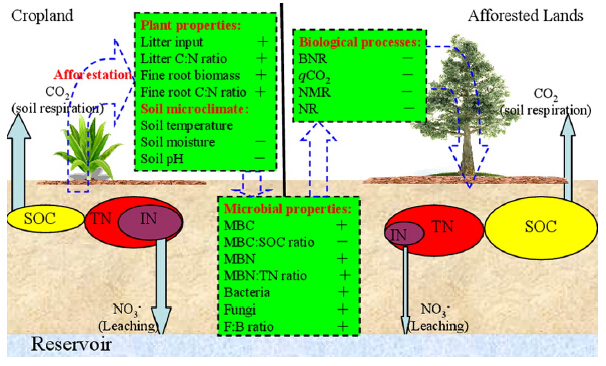Name:CHENG Xiaoli
Tell:
Email:xlcheng@fudan.edu.cn
Organization:Wuhan Botanical Garden
Afforestation Affects Soil Carbon and Nitrogen through Altering Microbial Community
2015-10-20
Afforestation has been proposed as an effective method for reducing the atmospheric CO2 concentration because of the ability to sequester C in vegetation and soil. Despite numerous studies have been conducted to investigate the contribution of afforestation to C sequestration on both regional and global scales, effect of afforestation on soil C accumulation remains a widely debated topic largely due to limited information regarding microbial interactions with soil C and N dynamics during afforestation.
Under the supervision of Prof. CHENG Xiaoli, DENG Qi, an associate research fellow of Wuhan Botanical Garden, conducted a field study in Danjiangkou Reservoir region of central China to investigate soil microbial community structure and biomass, soil C and N dynamics, plant traits and soil properties in the afforested (implementing woodland and shrubland plantations) and the adjacent copped lands in central China. The soil microbial carbon: soil organic carbon (MBC: SOC), soil microbial nitrogen: total nitrogen (MBN: TN) and fungi: bacteria (F: B) ratios were calculated and the microbial interacts with soil C and N dynamics were also assessed.
This study demonstrated that afforested soils averaged higher MBC, MBN and MBN: TN ratios than the croplands due to an increase in litter input, but lower MBC: SOC ratio resulting from low-quality (higher C: N ratio) litter. Afforested soils also had higher F: B ratio, attributed to a combination of factors including higher C: N ratios in litter and soil, and shifts of soil inorganic N forms, water, pH and disturbance.
A shift of soil microbial biomass and community structure following afforestation might be associated with the reduced basal microbial respiration, qCO2, net N mineralization and nitrification, which likely maintained higher soil C and N storage and stability.
This study found a shift in soil microbial biomass and community structure following afforestation, and indicated a potential mechanism for microbial interaction with soil C and N dynamic, which may have significant implications for the long-term C accumulation and sustainable development of afforestation ecosystems, and for he potential improvement of water quality in the Reservoir.
This research was financially supported by the National Natural Science Foundation of China and the “Strategic Priority Research Program-Climate Change: Carbon Budget and Relevant Issues” of the Chinese Academy of Sciences. Results have been published in Science of the Total Environment entitled “Soil microbial community and its interaction with soil carbon and nitrogen dynamics following afforestation in central China”

Conceptual model illustrating the potential microbial interactions with soil carbon and nitrogen dynamics during afforestation (Image by DENG Qi)